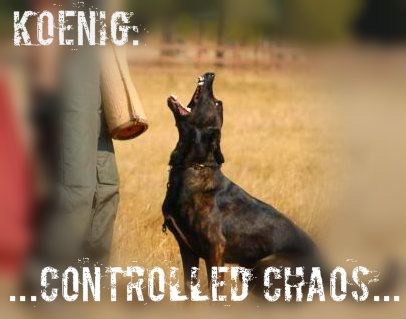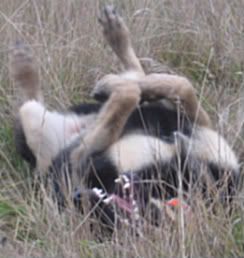Interesting discussion and I’m not sure exactly what your question is Betty but it sounds like one I’ve pondered many times too.
Edward came to me as a “bad” dog that bites, and bite he did. Bob and my brother got a couple of skin breakers and I got some pretty good bruises. I think he could have easily been labeled as a “fear biter” in today’s terms. I was just told he was “bad dog” from the get go.
I looked at his bites as warning shots in my case and with the guys, I just knew their approach wasn’t going to end favorably – for them.
What was particularly interesting to me was that it had nothing to do with resource guarding. In the early stages, he’d be the one walking away from his food, bones, toys, whenever someone or another dog approached. Cornered, handled aggressively or approached unexpectedly, he was going to give you all he had.
He came to me at 2 years old and at 7 I’ve never had a more solid, trustworthy dog. He did therapy work (loved all human connections) and developed a real fondness for kids - bouncing all around and even on him.
I see a lot of similarities in Vince but more differences. While I have 110% confidence that he wouldn’t think about biting me, at this point I still don’t think he would hesitate with a quickly approaching child, an eager elderly person and everyone in between. It’s strange, women seem to be the worst. Most men get a bit of a once over. Women enter the picture and his lip curls immediately. Of course this isn’t all inclusive and I can now read the energy he’s reacting to, which includes some men. I won’t get into the previous owner, but this single mother had ME on edge in the first 5 minutes.
Fear (nervous issues) is an interesting thing in dogs. While we as individuals in a society tolerate the reactive jitters and outbursts of each other, even have numerous professions that regress folks to the beginnings of their issues (which usually doesn’t includes the womb – sometimes), and even judges and juries that acquit folks, based on past circumstances that may have triggered their current reaction to horrendous deeds they’ve committed, we often don’t afford the same level of understanding to our canine companions. They’re a fear biting nerve bag; they must have been born that way.
Just a bit of a stretched human example from the way I look at it:
From all accounts, this was an otherwise, very nice man. He was confused, scared and full of fear for how many more exhausting hours lay ahead. He came to our country, (new home, new situation) did not speak the language and spent hours (10) in arrivals after a 15 hour flight to our Vancouver airport. He was just feet away from someone that could have helped him immediately, if by some stroke of luck the players in the situation could have understood that. But nope, they killed him.
http://www.youtube.com/watch?v=QPCgwCS3viQ
http://www.theglobeandmail.com/news/national/article790894.ece
Born to die like this? If only one person in that situation could have understood that this man simply wanted to connect with his mother (who was also just feet away, behind a wall), he would be alive today.
Had this been a woman (Chihuahua, Peekapoo, Shih Tzu) in the exact same circumstance, would the compassion necessary to rectify this situation have been applied instead of the immediate labeling judgment that “scared everybody” and no one willing to take the time to understand what was going on for him?
Would just anybody have been qualified to go up and approach this man? Absolutely not, however the ones that did had no understanding of what they were dealing with, only what they saw. A polish psychologist could have rectified this in minutes.
Had this man survived, would we expect that he immediately have a fond regard for all airports and tasers? That he immediately seek out RCMP officers to befriend? If he had strong nerves, should he be expected just to shrug it off? I know, more questions than answers and way toooooo much anthropomorphism, but I’m human and it’s an example of what makes sense to me.
Can all dogs be put in all situations that we, as a society, deem “social”? I don’t believe so but given half a chance to unpack their bags, with the right guidance and a learning environment, conducive to their learning style, I think they all have a potential to bring their unique prospective to the table without the fear and need to lash out because of it.
And while I get what all the literature (experts) say about bad genes, and agree to some extent, I don’t think they’re "born" to bite out of fear. I think that somewhere along the line (often very young) this has been an effective last resort (or first in some cases) and they’ve never been shown or conditioned to understand that an effective alternative exists.
I’ll probably get flack for this but for the sake of discussion, I think in many cases (certainly not all) it has more to do with the person doing the labeling than it has to do with an understanding of what got the dog to the place he’s at. Genetics is an easy answer.
 Previous Topic
Previous Topic Index
Index Next Topic
Next Topic












 Top
Top



.jpg)
.jpg)
